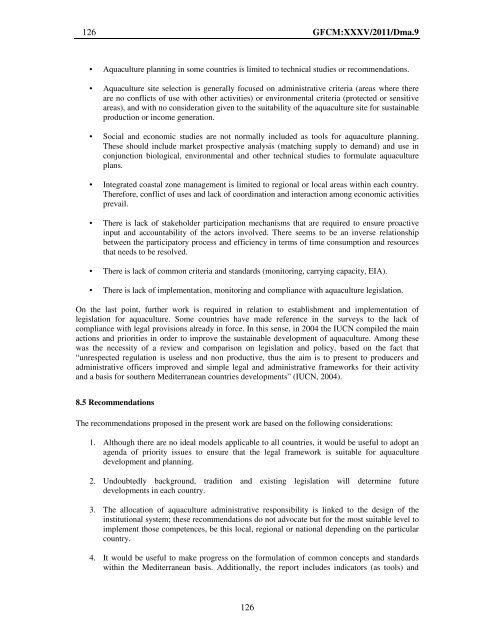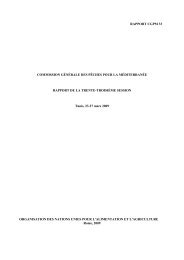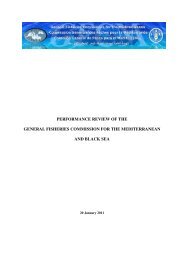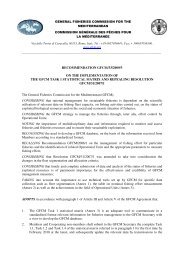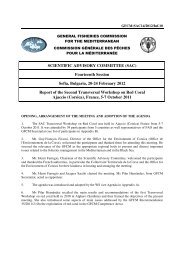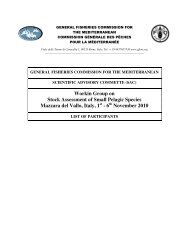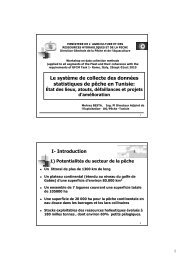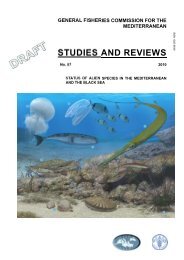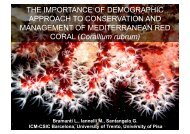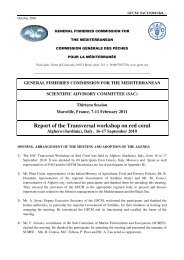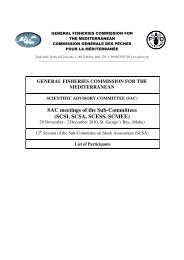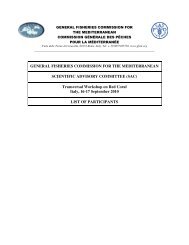Site selection and carrying capacity in Mediterranean ... - FAO Sipam
Site selection and carrying capacity in Mediterranean ... - FAO Sipam
Site selection and carrying capacity in Mediterranean ... - FAO Sipam
Create successful ePaper yourself
Turn your PDF publications into a flip-book with our unique Google optimized e-Paper software.
126 GFCM:XXXV/2011/Dma.9<br />
• Aquaculture plann<strong>in</strong>g <strong>in</strong> some countries is limited to technical studies or recommendations.<br />
• Aquaculture site <strong>selection</strong> is generally focused on adm<strong>in</strong>istrative criteria (areas where there<br />
are no conflicts of use with other activities) or environmental criteria (protected or sensitive<br />
areas), <strong>and</strong> with no consideration given to the suitability of the aquaculture site for susta<strong>in</strong>able<br />
production or <strong>in</strong>come generation.<br />
• Social <strong>and</strong> economic studies are not normally <strong>in</strong>cluded as tools for aquaculture plann<strong>in</strong>g.<br />
These should <strong>in</strong>clude market prospective analysis (match<strong>in</strong>g supply to dem<strong>and</strong>) <strong>and</strong> use <strong>in</strong><br />
conjunction biological, environmental <strong>and</strong> other technical studies to formulate aquaculture<br />
plans.<br />
• Integrated coastal zone management is limited to regional or local areas with<strong>in</strong> each country.<br />
Therefore, conflict of uses <strong>and</strong> lack of coord<strong>in</strong>ation <strong>and</strong> <strong>in</strong>teraction among economic activities<br />
prevail.<br />
• There is lack of stakeholder participation mechanisms that are required to ensure proactive<br />
<strong>in</strong>put <strong>and</strong> accountability of the actors <strong>in</strong>volved. There seems to be an <strong>in</strong>verse relationship<br />
between the participatory process <strong>and</strong> efficiency <strong>in</strong> terms of time consumption <strong>and</strong> resources<br />
that needs to be resolved.<br />
• There is lack of common criteria <strong>and</strong> st<strong>and</strong>ards (monitor<strong>in</strong>g, <strong>carry<strong>in</strong>g</strong> <strong>capacity</strong>, EIA).<br />
• There is lack of implementation, monitor<strong>in</strong>g <strong>and</strong> compliance with aquaculture legislation.<br />
On the last po<strong>in</strong>t, further work is required <strong>in</strong> relation to establishment <strong>and</strong> implementation of<br />
legislation for aquaculture. Some countries have made reference <strong>in</strong> the surveys to the lack of<br />
compliance with legal provisions already <strong>in</strong> force. In this sense, <strong>in</strong> 2004 the IUCN compiled the ma<strong>in</strong><br />
actions <strong>and</strong> priorities <strong>in</strong> order to improve the susta<strong>in</strong>able development of aquaculture. Among these<br />
was the necessity of a review <strong>and</strong> comparison on legislation <strong>and</strong> policy, based on the fact that<br />
“unrespected regulation is useless <strong>and</strong> non productive, thus the aim is to present to producers <strong>and</strong><br />
adm<strong>in</strong>istrative officers improved <strong>and</strong> simple legal <strong>and</strong> adm<strong>in</strong>istrative frameworks for their activity<br />
<strong>and</strong> a basis for southern <strong>Mediterranean</strong> countries developments” (IUCN, 2004).<br />
8.5 Recommendations<br />
The recommendations proposed <strong>in</strong> the present work are based on the follow<strong>in</strong>g considerations:<br />
1. Although there are no ideal models applicable to all countries, it would be useful to adopt an<br />
agenda of priority issues to ensure that the legal framework is suitable for aquaculture<br />
development <strong>and</strong> plann<strong>in</strong>g.<br />
2. Undoubtedly background, tradition <strong>and</strong> exist<strong>in</strong>g legislation will determ<strong>in</strong>e future<br />
developments <strong>in</strong> each country.<br />
3. The allocation of aquaculture adm<strong>in</strong>istrative responsibility is l<strong>in</strong>ked to the design of the<br />
<strong>in</strong>stitutional system; these recommendations do not advocate but for the most suitable level to<br />
implement those competences, be this local, regional or national depend<strong>in</strong>g on the particular<br />
country.<br />
4. It would be useful to make progress on the formulation of common concepts <strong>and</strong> st<strong>and</strong>ards<br />
with<strong>in</strong> the <strong>Mediterranean</strong> basis. Additionally, the report <strong>in</strong>cludes <strong>in</strong>dicators (as tools) <strong>and</strong><br />
126


